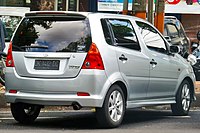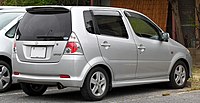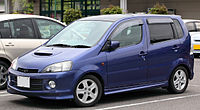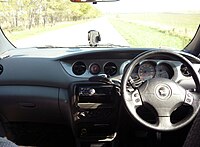Daihatsu YRV
| Daihatsu YRV (M200) | |
|---|---|
 | |
| Overview | |
| Manufacturer | Daihatsu |
| Production | August 2000 – September 2005 |
| Assembly | Japan |
| Designer | Aisaka Tadashi and Hirofumi Ishizaki |
| Body and chassis | |
| Class | Mini MPV |
| Body style | 5-door hatchback |
| Layout | |
| Related | Daihatsu Storia |
| Powertrain | |
| Engine | |
| Power output |
|
| Transmission | |
| Dimensions | |
| Wheelbase | 2,370 mm (93.3 in) |
| Length | 3,765 mm (148.2 in) |
| Width | 1,620 mm (63.8 in) |
| Height | 1,535–1,565 mm (60.4–61.6 in) |
| Curb weight | 860–990 kg (1,896–2,183 lb) |
| Chronology | |
| Predecessor | Daihatsu Pyzar/Gran Move |
| Successor | Daihatsu Coo/Materia |
The Daihatsu YRV (Japanese: ダイハツ・YRV (ワイアールブイ), Daihatsu Waiārubui) is a mini MPV which was manufactured by the Japanese automaker Daihatsu from 2000 to 2005. The name "YRV" is an abbreviation for "Young Recreational Vehicle".[1] The YRV is based on the contemporary Daihatsu Storia/Sirion; it offered a sportier character, nimbler handling, and more powerful engine options than its period competitors in the Japanese market.[2]
Engines and trim levels
[edit]A four-wheel drive system named "4Trak" is available only with the 1.3 L K3-VE engine internationally. A Japanese domestic market turbocharged version was also available. All other versions are equipped with front-wheel drive system. There was also the F-Speed semi-automatic transmission version.[3] The gear shifter was mounted on the steering column (called a "dashboard shift" by Daihatsu); along with minor updates in December 2001, the YRV Turbo received the more common, floor-mounted shifter instead.[2]
While the handling had been described as "European" in the Japanese domestic market, the turbocharged YRV was deemed to need additional tuning. The new engine was mounted in a Sirion for initial testing, and then the YRV underwent more testing and modification before going on sale in Europe.[2] A premium specification was also available; this featured the naturally aspirated K3-VE engine, side skirts and five-spoke alloy wheels. This version was the highest selling YRV specification of the three in the United Kingdom and remains the most common variant there.[4]
The YRV has an option for an electronically controlled 4-speed automatic transmission. The international-market YRV Turbo comes with this transmission as standard equipment.
A four-wheel drive Japanese domestic market version was available at launch and up until discontinuation in 2005. This version had a turbocharged 1.3 L K3-VET engine, producing 140 PS (103 kW) in Japanese specifications, and an electronically controlled 4-speed automatic transmission or an upgraded 5-speed manual transmission option, exclusively for this model.[2]
Gallery
[edit]-
Rear view (early model)
-
Rear view (late model)
-
Daihatsu YRV Turbo
-
Interior
References
[edit]- ^ "Young, sexy, and upwardly mobile – and that's just the driver". Wicklow People. 15 November 2001 – via Irish Independent.
- ^ a b c d Masaya, Takahashi (2020-10-10). "意地と底力を見せたカッ飛びワゴン、ダイハツYRVは良くも悪くも「ダイハツ車」だった" [The Daihatsu YRV, a fast-moving wagon that showed spirit and potential, was, for better or worse, a "Daihatsu car"]. Motor Fan (in Japanese). Archived from the original on 2021-12-01.
- ^ "(2001 - 2005) Daihatsu YRV review | Exchange and Mart".
- ^ Smith, Olly. "Daihatsu YRV Premium". How Many Left?. Retrieved 2017-02-13.




